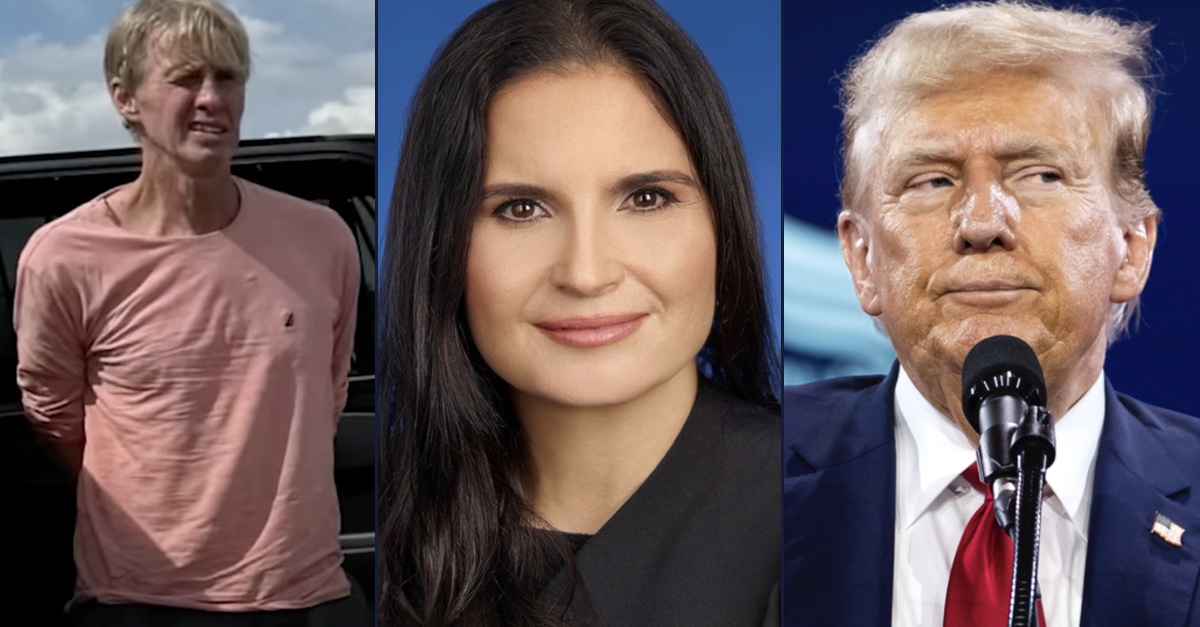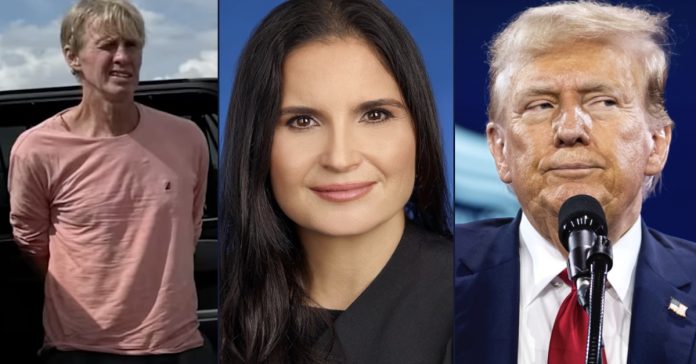
Left: Ryan Wesley Routh (Law&Crime). Center: U.S. District Judge Aileen Cannon (U.S. District Court for the Southern District of Florida). Right: Donald Trump speaks at the annual Road to Majority conference in Washington, DC, in June 2024 (Allison Bailey/NurPhoto via AP).
A federal judge in Florida has once again rejected efforts by a local man to narrow the scope of his criminal prosecution for allegedly attempting to assassinate President Donald Trump last year at one of his golf courses — this time denying a motion to suppress an “out-of-court” witness identification, days after shooting down a bid to dismiss some of his charges.
U.S. District Judge Aileen Cannon, a Trump appointee whose rulings in his Mar-a-Lago classified documents case largely cut the prosecution off at its knees, issued an order Saturday denying a motion from defendant Ryan Routh, who sought to suppress a “show-up” witness identification made shortly after the alleged assassination attempt.
A “show-up” witness identification is a procedure in which police present a suspect or photos of them to a witness for identification after a crime occurs, as opposed to a lineup, which involves a witness looking at additional faces.
Routh is facing a five-count federal indictment, including attempted assassination of a major presidential candidate, possessing a firearm in furtherance of a crime of violence, and assault of a federal officer. In April, he moved to dismiss the last two counts of the indictment: possession of a firearm with an obliterated serial number and illegally owning a firearm as a convicted felon.
Routh has a prior conviction for possession of dynamite. His lawyers argued that the two charges were “unconstitutional” and violated his Second Amendment rights.
Cannon shot down that bid on May 22.
On Saturday, the judge ripped Routh for failing to justify his suppression argument and the need for an evidentiary hearing on the identification issue, noting that his motion did not raise any critical facts “other than one conclusory, speculative, and indefinite line” at the end of the document that a “hearing would be helpful to the court to resolve any disputed factual issues,”” according to Cannon.
“That formulation is telling,” she said.
Routh’s public defenders had argued that the identification was “unduly suggestive” and conducted in a “highly-controlled” environment, ultimately violating his due process rights. They also said a “subsequent photo presentation” violated Routh’s rights as well, but prosecutors are not seeking to introduce evidence of the presentation at trial.
As Law&Crime previously reported, Routh in September 2024 was arrested in Florida after a Secret Service agent allegedly spotted him with a rifle “in the exterior brush along the fence line near the 6th hole putting green” at the Trump International Golf Club in West Palm Beach as the former president golfed one hole behind. The agent opened fire, leading Routh to allegedly flee the scene.
Police say a witness was able to identify Routh after seeing him dart out from the woods, alleging he was “99.9 percent” sure that Routh was the assassination attempt suspect, according to Cannon. Routh’s lawyers argued in their motion to suppress, which was filed on April 7, that the “show-up identification procedure” was aggravated by the “type of transportation of the eyewitness and presentation of Mr. Routh,” per the motion.
“The witness was flown by helicopter to the middle of a closed down I-95,” Routh’s lawyers said.
“Routh, in handcuffs, was placed by himself as the only option,” their motion stated. “And the FBI then showed a single picture of Routh. With these repeated, high-pressured, police-influenced identification tactics, any well-meaning civilian would be predisposed to make such an identification.”
Cannon disagreed, ruling that police instead “acted promptly” and delivered “careful warnings” that Routh should “not feel pressured to make a positive identification; that the individual may or may not be the person he saw fleeing; and that the investigation would continue regardless,” according to her order.
“These actions did not unconstitutionally enhance the suggestiveness of the show up,” Cannon said. “Further, while defendant cites the particular circumstances of this case as purported evidence of undue suggestiveness — i.e., high number of officers on scene, blocked highway location, handcuffs on defendant, and a helicopter transport of a civilian witness to facilitate a confrontation 40 miles away — the motion does not offer any legal authority suggesting that any of those circumstances, whether individually or in combination, warrant reaching a different conclusion here on suggestiveness than reached by the various courts … that have rejected efforts to suppress identifications.”
Routh has pleaded not guilty to his charges. He is also facing state charges, including attempted first-degree murder and terrorism. If convicted in the federal case, he faces a maximum sentence of life in prison.

